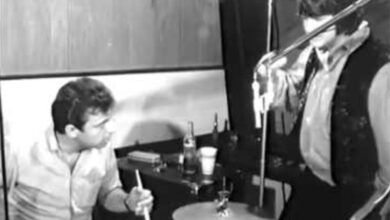Elvis’s Last Performance: A Brave Attempt Amid Obvious Health Challenges
Elvis Presley, known as the “King of Rock and Roll,” remains an enduring figure in the music landscape, celebrated for his vocal prowess, charismatic performances, and significant influence on modern music. Born on January 8, 1935, in Tupelo, Mississippi, he showed an early fascination with music, influenced by a mix of gospel, country, and rhythm and blues. His first foray into recording began in 1953 with a Memphis-based label, Sun Records, which helped launch his groundbreaking career. By the mid-1950s, Presley’s distinctive style, blending various genres, captivated audiences and set the stage for a rock revolution.
In the years that followed, his music soared to immense heights, bringing hits like “Heartbreak Hotel,” “Hound Dog,” and “Jailhouse Rock” to the forefront of popular culture. Not only did his music challenge the musical standards of the time, but his provocative stage presence also drew both fervent fans and critics, marking him as a controversial yet iconic figure. Presley became a pioneer of rock music, infusing it with elements of performance art, cinematic flair, and personal charisma, creating a blueprint which would influence countless artists in subsequent decades.
Presley’s film career also blossomed during this time, with over 30 feature films to his name, reinforcing his status in American pop culture. Notable films such as “Love Me Tender,” “Viva Las Vegas,” and “Jailhouse Rock” showcased his acting abilities while offering a platform for his iconic songs. Although his film roles were often met with mixed critical reception, they contributed significantly to his fame and helped him reach new audiences beyond music.
As the 1960s progressed, Presley’s career saw phases of both commercial success and personal struggle. The transition to a more mature sound as the pop music landscape evolved posed challenges; he faced criticism and momentary declines in popularity. However, in 1968, the “Comeback Special” brought Presley back into the spotlight, displaying his raw talent in a stripped-down performance that emphasized his rock roots. This special revitalized his artistic direction, leading to a new series of hits in the following years.
Presley’s marriage to Priscilla Beaulieu in 1967 was another focal point in his life, though it came with its own set of complexities. They had a daughter, Lisa Marie Presley, but after years of ups and downs, their marriage ended in divorce in 1973. This personal turbulence, fraught with scrutiny from the public eye, marked a significant part of Presley’s later years, influencing his music and public persona profoundly.
Despite his successes, the bright lights of fame came with shadows, particularly concerning his health. As his career continued into the 1970s, Presley struggled with various issues, including substance abuse, which significantly impacted his personal and professional life. Described as a tragic figure by many, his declining health and physical state became more evident during his final performances. Even amid these challenges, his vocal talent remained formidable, showcasing his ability to connect with fans during every show.
The end came too soon; Presley passed away on August 16, 1977. His last public concert, which occurred in June of that year, is remembered for its emotional weight and the poignant delivery of his songs. As attendees witnessed the King on stage, there was a sense of nostalgia and heartbreak, knowing that this would be a final bow for a musical legend. The heartfelt reactions from fans, reminiscing on his remarkable legacy, underscored the profound impact he had on the cultural landscape of music.
In his last televised performance in Indianapolis, just weeks before his death, the talented yet troubled artist confronted personal and health challenges while still managing to deliver memorable moments through his iconic songs. The mixture of vulnerability and strength in his music resonated deeply with audiences, capturing the essence of his lifelong journey as an artist. The way he intertwined personal experiences with his performance of “Are You Lonesome Tonight?” served as a window into his heart and mind, leaving a lasting impression on fans who bore witness.
Further exploration into his legacy shows that in the years following Presley’s passing, his music has continued to thrive. His extensive catalog remains influential, and his recordings have seen various revivals through remixes, films, and tributes. Artists across generations cite Elvis as an inspiration, demonstrating the lasting power of his artistry. The yearly pilgrimage of fans to Graceland – his iconic home that has become a shrine to his memory – serves as testament to his enduring appeal.
Elvis Presley’s life and career encapsulated a transformative era in music history, marked by both extraordinary achievement and profound personal struggle. His story is a reminder of the complexity of fame and the fragile nature of life itself. Even decades after his departure, the music and images of a young Elvis still resonate, compelling fans through the timeless quality of his voice and the rich legacy he left behind. Such legacies, woven into the fabric of popular culture, ensure that the King of Rock and Roll will forever reign in the hearts of millions.





